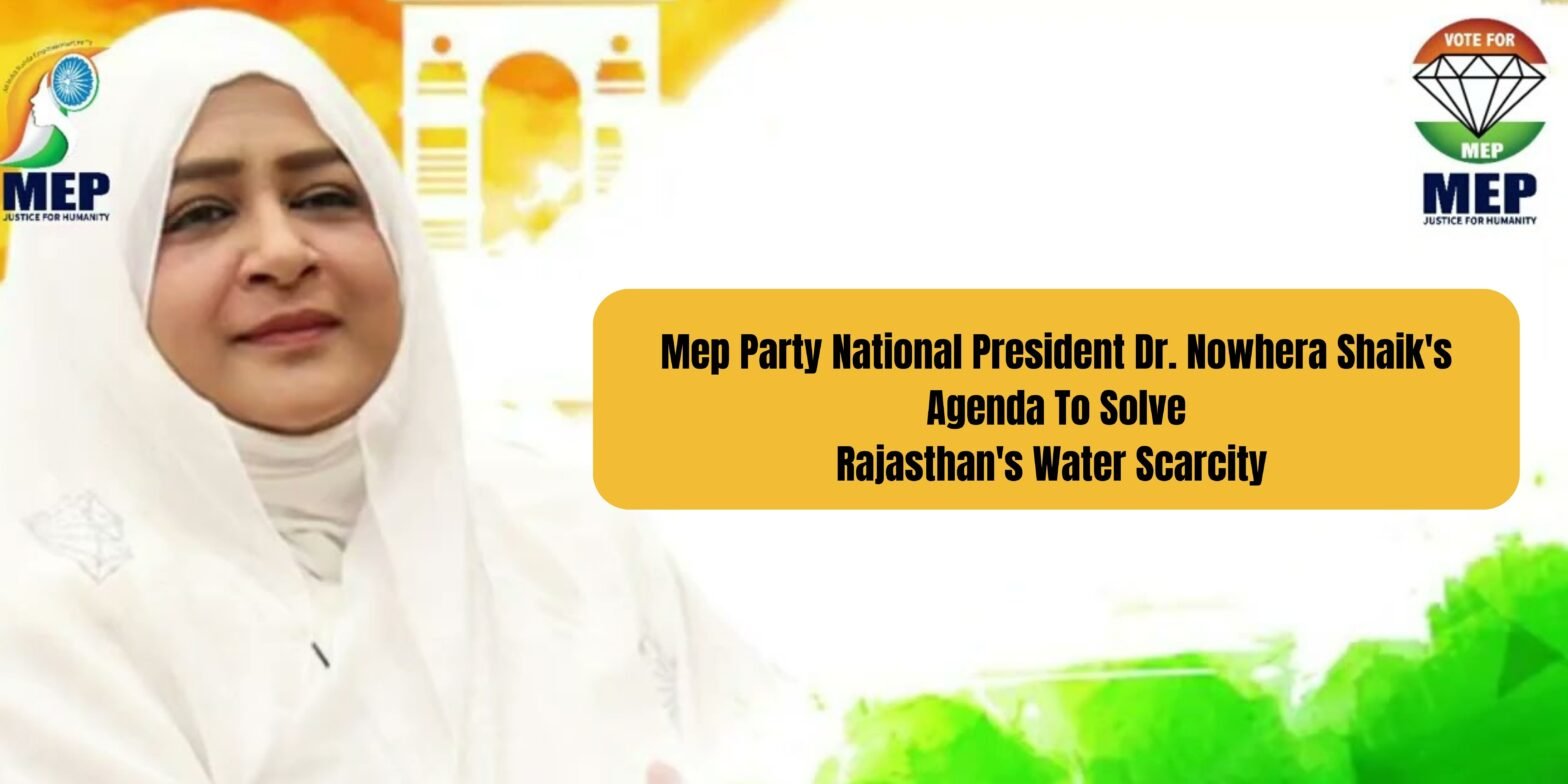Nowhera Shaik, the President of the All India Mahila Empowerment Party, is poised to make a significant impact on the state of Rajasthan if her party assumes power.
The upcoming 2023 Rajasthan Assembly election is a pivotal moment for the state, with the polls scheduled for November 25 and the results expected to be declared by December 5, as per the Election Commission.
One of the most pressing issues that she is determined to address is the chronic problem of water scarcity that has plagued Rajasthan for years.
Rajasthan, the largest state in India land area, covers a vast expanse, accounting for approximately 11% of the country’s total landmass. However, it faces a critical challenge—water scarcity. Despite its enormous size, Rajasthan receives only a mere 2% of the national water supply. This stark contrast highlights the severity of the water crisis in the state.
The root causes of this water scarcity in Rajasthan are multifaceted. The absence of major rivers that can provide a consistent water source for the state’s residents is a significant contributing factor. Also, the presence of the expansive Thar Desert further compounds the issue, as it creates arid conditions and adds to the challenge of securing sufficient water resources.
Jaipur, the state capital, epitomizes the water issues faced by Rajasthan. A report titled “Water Scarcity in Jaipur,” published by Northwestern University, has shed light on the dire situation. Jaipur grapples with a daily shortage of a staggering 90 million liters of water. This alarming statistic underscores the acute nature of the water crisis, and it becomes even more concerning when one considers the situation in other cities and regions across the state.
Several cities in Rajasthan, including Pali, Jodhpur, and Sirohi, are grappling with water scarcity. The problem extends to the city of Barmar, where delayed water supply during scorching heatwaves has become a major concern for residents. The insufficiency of power supply compounds the issue further, directly affecting the availability of water and exacerbating the overall water crisis in many cities. The interplay between power supply and water availability underscores the complex nature of the challenge.
Recent protests in Jodhpur, where BJP activists voiced their concerns about the escalating water crisis and rising electricity rates, are symptomatic of the mounting frustrations of the people. These activists submitted a memorandum to the sub-divisional officer on behalf of the state’s governor, highlighting the daily struggles faced by the citizens due to the scarcity of water and electricity, particularly during the severe heatwave conditions.
Her commitment to addressing these issues is grounded in a comprehensive understanding of the challenges that Rajasthan faces. Her party, the All India Mahila Empowerment Party, has made it a central part of their agenda to tackle water scarcity and the related power supply concerns that compound the problem.
The first step in addressing the water crisis in Rajasthan is to adopt a holistic approach to water management. This includes not only finding ways to source additional water but also efficiently managing and distributing the available water resources. Developing new reservoirs, improving water storage, and exploring innovative methods for water conservation can make a substantial difference.
Furthermore, the availability of electricity plays a pivotal role in addressing water scarcity. Insufficient power supply often leads to disruptions in water distribution, affecting households, industries, and agriculture. Hence, addressing the power supply issues is integral to mitigating the water crisis. This might involve investing in renewable energy sources to ensure a stable and consistent power supply, particularly during peak demand periods.
In addition to infrastructure and resource management, public awareness and education are key components in any strategy to combat water scarcity. Initiatives to promote water conservation and responsible water usage can help reduce the burden on existing resources. Community engagement, including awareness campaigns and educational programs, can play a significant role in changing behaviors and fostering a culture of water responsibility.
All India Mahila Empowerment Party, is committed to addressing the water scarcity issue in Rajasthan with a multifaceted approach.
The state’s water crisis is a complex problem with roots in both the availability of water resources and power supply issues. By focusing on resource management, investing in infrastructure, promoting responsible water usage, and ensuring a consistent power supply, her party aims to provide tangible solutions that will alleviate the suffering of Rajasthan’s citizens.
